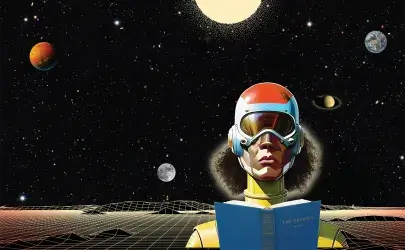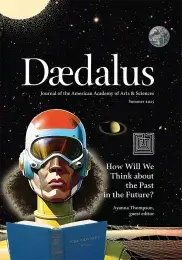
How We Will Think about the Past in the Future?
How will we think about the past in the future? The central question for this Dædalus issue asks artists and scholars to speculate about what aspects of our present historical moment will enrapture, haunt, and/or plague thinkers in the future. The contributors–scientists, social scientists, humanists, and artists–conjure up the methodologies, theories, and scholarly and artistic practices we will need not only to rectify current harms, but also to usher in more equitable futures.
Now?
This essay brings Afrofuturism, and its notion of the plasticity of time, to imagine how we will think of the past in the future and, more specifically, to consider what will “enrapture, haunt, and/or plague thinkers in the future.” Although many answers come to mind, including this country’s original sin—slavery—ultimately this essay turns to our current technologies, especially policing technologies. And this essay turns the question around to ask, “How should we in the present think about the future? And what can we do now to change it?”
Back to the Future for Taxation
Taxation is an art, not a science, of measuring and auditing. Faced with the challenge of putting machine labor on a level playing field with human labor, the two leading forms of twentieth- and early twenty-first-century taxation, income taxation and general consumption taxation, were wrecked at their roots. What emerged from that wreckage was a return to historic norms: a series of excise taxes and charges, but this time with the avowed and focused purpose of not only raising revenue but also pricing and internalizing otherwise externalized harms to the self and to the biosphere.
What Is to Be Done?
This essay offers a view of the American theater, especially the American nonprofit theater, in historical perspective, real and imagined. The essay understands the current state of the American theater as a phase in a 2,500-year history of the Western theater, and sees its present form as a high-priced commodity to be anomalous and contradictory to the goals inherent within the art form. The essay imagines a future world where the current organization of our theater seems strange and inexplicable, and tries to elucidate, for the sake of that imagined audience, how we’ve ended up here.
Future Problem-Solving: Artificial Intelligence & Other Wildly Complex Issues
Imagine a bright future for philanthropic and government problem-solving. There is a version of the development of artificial intelligence, open datasets, and equitable philanthropic practices that could enable societies to solve their most complex problems much more effectively than is possible today. Philanthropy has been shifting from a model of charitable giving toward support for systems-level change. In recent decades, new digital technologies have largely served private ends, such as wealth creation and industrial efficiencies, rather than the public interest. Datasets are too often held in private hands for proprietary ends. These factors could converge in a more positive direction for a wider array of humans. This future will not come about on its own if left to private markets alone. But with planning and foresight, a brighter future for the climate, international peace, economic inclusion, and other broad societal goals is within reach.
Academic Cultures: Toward Perspective from the Future
To envision the future of academic culture, we consider the epistemic, administrative, and social dimensions of the American research university. Given the existential cultural, economic, political, social, and environmental dilemmas that confront society, constituents and stakeholders alike would be justified in contemplating the academy three or four generations hence with a degree of apprehension. Leaving aside the most dystopian prospects, we summon historical perspective and speculate about the future of academic culture to critique the contemporary research university in an effort to propose new models going forward. We also consider the institutional contexts of knowledge production and examine the imperative to recognize the plurality of academic culture. We argue that if constituents assume that the venerable genealogies that support academic cultures guarantee their perpetuation, they will fail to act with the sense of urgency that is required to meet the entangled challenges ahead.
The Ongoing Biomedical Revolution Created by Rethinking How to Learn
Future generations will remember our present era for its revolution in biomedical discovery and practice. A near doubling in life expectancy and the cure of diseases previously untreatable reflect this seismic shift. Embracing the scientific method in research and practice fueled this change. Well-known but often overlooked, this method underpins modern bioscience by providing a ratcheting directional engine that advances knowledge and clinical care. Medicine has always been scientific, but it is also a practical art. Historically, its teaching relied on experts passing knowledge to students in the master-apprentice model. The modern emergence of evidence-based teaching, rooted in the scientific method and realized through clinical research, has led to countless new discoveries and improved outcomes. Central to this revolution lies a willingness to test and challenge doctrine, including appraising how to collect, analyze, and validate scientific evidence itself.
Securing All the World’s Pasts for Our Common Future
This essay calls on us to future-proof the study of the world’s pasts by creating a new field, ancient studies, that would replace “classics” and “classical studies” by drawing together scholars of ancient cultures from disciplines and area studies around the world. Our current disciplinary divisions, burdened by prejudices about race, religion, and national identity, are hindering intellectual exchange and collaboration. Approaching ancient studies from a global perspective demands the conservation of a global archive; commitment to its preservation will help restore the humanity stolen from people invaded, enslaved, exploited, erased, and ignored in past centuries and today. The vitality of the archive’s contents will enrich our care for the world in all its variety and complexity and help us imagine a better future for all our pasts—as well as for ourselves and generations to follow.
Let’s Get Lost in the Cycle of Time Together
This short play explores the interconnectedness of life over generations, despite humanity’s attempts to isolate itself. The play is written to be performed by three actors, each playing multiple characters, transforming from scene to scene.
Speaking in Future Tongues: Languaging & the Gifts of Spirit
In this essay, an ancient historian imagines 2050 as awash in languages: ancient, modern, alien. Animating that vision are memories of teenage weekends spent praying in tongues, and of an ancient Mediterranean text foundational to the adult (re)appraisal of those weekends: Acts of the Apostles. I work through an exposition and reading of Acts 2, concentrating on the scene of glossolalia at Pentecost in order to mount a case for diasporic languaging as a spark to worthy excess—of speech and of difference. Shuttling from the autobiographical to the historical and back again, the essay’s insistent refrain is that diasporic vertigo is not merely a force for good but a good in itself. In the struggle against the commodification and imperialization of language, we can stake out and strive toward a future of flourishing linguistic expressivity, provided the material conditions for that expressivity are secured and safeguarded.
Another Other: An Unlikely Path to a Future United World—and What That Future Would Think About Us
We are separated from the future by a chasm of imagined apocalypses and miracles. We are separated from the technological foundation of our society by a chasm of scale between the individual self and the global manufacturing network. And we are separated from each other by chasms of bias and fear. Despite—or maybe because of—some of our looming apocalypses, our future selves might be less separated from technology and from each other. Population decline, the creation of self-sustaining Throughline communities, and the eventual discovery of alien life create possible futures populated with viewpoints that might see us, the Before Time people, as barbarians or, conversely, as technological gods.
